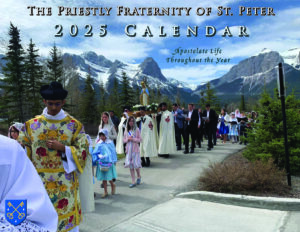Stop Staring at Light Bulbs
by Fr. Gerard Saguto, FSSP.
We all know how frustrating things can get with the varied degrees of shortcomings displayed by the human element of the Church.
Temptations to question the veracity of the Church may begin to slowly foment in the hearts and minds of those trying to walk the straight and narrow path that leads to eternal life.
Prudentially, while there is some responsibility to keep ourselves reasonably informed about what may or may not be going on, there are limits to this, and especially if we find the news upsetting our inner peace and adversely affecting the performance of the duties of our states in life, one of the four principal means to salvation (something perhaps for a later post).
Keeping a cool head in times of trial and stress is important, and a contributing component to that is to keep an objectivity about things.

After all, staring at a lit light bulb long enough makes everything else around it dark, and we lose needed circumspection – and joy.
In remedy to this, these wise words of Frank Sheed from Christ in Eclipse written in 1978 and one of his last books, and indeed one that is highly recommended to be read, should be taken to heart (all emphases original).
Excerpt from Frank Sheed’s Christ in Eclipse
“In the criticisms uttered by many who do not get around to leaving the Church, there is the same failure to see Christ as the whole point.
“So much in her daily running they find depressing – the sermons, they say, take no one deeper into the reality of God or man; this priest or that cares for nothing but money, the sick neglected, the old rejected; the hierarchy know nothing of the emotional or intellectual problems that are eating away at the vitality of their people’s faith; the Curia is simply a bureaucracy, using every trick to hold on to its power; as for the pope …. It adds up to the ‘Institutional Church,’ with so many wondering if their spiritual integrity will permit them to remain in her.
“I am meeting this wherever I go. I have fallen into the way of reminding the objector that Institutional Israel, the Chosen People, as the Prophets show it, was even worse than the harshest critics think the Catholic Church: yet it never occurred to the holiest of Jews to leave it.
“They knew that however evilly the administration behaved, Israel was still the people of God. So with the Church: an administration is necessary if the Church is to function, but Christ is the whole point of the functioning.
“We are not baptized into the hierarchy, do not receive the cardinals sacramentally, will not spend eternity in the beatific vision of the pope.
 “St. John Fisher could say in a public sermon: ‘If the Pope will not reform the Curia, God will.’ A couple of years later he laid his head on Henry VIII’s block for papal supremacy, followed to the same block by Thomas More, who had spent his youth under the Borgia pope, Alexander VI; lived his manhood under the Medici pope, Leo X; and died for papal supremacy under Clement VII, as time-serving a pope as Rome had had.
“St. John Fisher could say in a public sermon: ‘If the Pope will not reform the Curia, God will.’ A couple of years later he laid his head on Henry VIII’s block for papal supremacy, followed to the same block by Thomas More, who had spent his youth under the Borgia pope, Alexander VI; lived his manhood under the Medici pope, Leo X; and died for papal supremacy under Clement VII, as time-serving a pope as Rome had had.
“Christ is the point. I myself admire the present pope, Paul VI; but even if I criticized him as harshly as some do, even if a successor proved to be as bad as some of those who have gone before, even if I sometimes find the Church as I have to live in her a pain in the neck, I should still say that nothing a pope could do or say would make me wish to leave the Church, though I might well wish that he would.
“Israel, through its best periods as through its worst, preserved the truth of God’s Oneness in a world swarming with gods, and the sense of God’s Majesty in a world sick with its own pride. So with the Church.
“Under the worst administration – say as bad as John XII’s a thousand years ago – we could still learn Christ’s truth, receive His life in the sacraments, be in union with Him to the limit of our willingness. In awareness of Christ, I can know the Church as His Mystical Body. And we must not make our judgments by the neck’s sensitivity to pain!”
November 20, 2020

Sacrifice for Starving Souls
Join us for Giving Tuesday: https://fssp.com/giving-tuesday/ .
November 18, 2020

Giving Tuesday: December 1, 2020
If you’re like us at FSSP North American headquarters, you’ve grown weary of reading about the “uncertain times” in which we live. Most people seem to assume that this uncertainty stems from forces beyond our control. But in fact, the unsettled state of our society is self-inflicted.
 For years, those in power have told us that it is not only permissible but laudable to be uncertain about gender identity, the sanctity of human life, the indissolubility of marriage, and even the very concept of absolute truth. Hence the current implosion.
For years, those in power have told us that it is not only permissible but laudable to be uncertain about gender identity, the sanctity of human life, the indissolubility of marriage, and even the very concept of absolute truth. Hence the current implosion.
Sadly, this implosion is evident even within Holy Mother Church. High-ranking churchmen have boldly proclaimed that we can no longer be certain about listing abortion first among the injustices in society, about restricting Holy Orders to men, or about the immorality of praying to false idols in a consecrated building.
Thanks be to God, then, for our traditional Catholic faith, through which we can be certain of a great many things.
We can be certain that Jesus Christ is truly present—Body, Blood, Soul, and Divinity—in the Holy Eucharist. We can be certain that the holy priest on the other side of the grill is acting in persona Christi when he says, “I absolve you in the name of the Father, and of the Son, and of the Holy Ghost.” We can be certain that each of us will receive a particular judgment—and that we had better spend each day preparing ourselves to meet Our Lord.
Help the FSSP Spread Truth in Our Troubled World
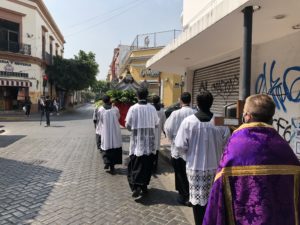 The best response to our “uncertain” times is to make the certainty of traditional Catholicism available to as many souls as possible. Unfortunately, the coronavirus lockdown has forced numerous restrictions on FSSP apostolates across North America. Some parishes still must limit their congregation sizes, and in a few places civil governments and dioceses are returning to lockdowns once again.
The best response to our “uncertain” times is to make the certainty of traditional Catholicism available to as many souls as possible. Unfortunately, the coronavirus lockdown has forced numerous restrictions on FSSP apostolates across North America. Some parishes still must limit their congregation sizes, and in a few places civil governments and dioceses are returning to lockdowns once again.
Rather than let their parishioners starve spiritually, our FSSP priests have responded with heroic generosity. Some parishes are now offering as many as 10 Masses on Sundays. Some offer five Masses each weekday. Many have extended their hours for confession.
But even FSSP priests have their limits.
Canon law limits each priest to celebrating two Masses on weekdays and three Masses on Sundays. Thus, an FSSP apostolate with three priests can only offer nine Sunday Masses. This is not always enough for an apostolate that’s attracting hundreds of new parishioners who have grown frustrated by the restrictions of their previous parishes and seek a fuller spiritual life.
This year on Giving Tuesday, the FSSP aims to raise $90,000 to help us meet the pastoral and sacramental challenges of the times.
Please Make Your Gift on December 1
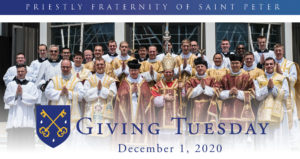 Giving Tuesday is an annual online event in which nonprofits of all kinds seek to raise money on the Tuesday after Thanksgiving. This year’s Giving Tuesday will be on December 1, 2020.
Giving Tuesday is an annual online event in which nonprofits of all kinds seek to raise money on the Tuesday after Thanksgiving. This year’s Giving Tuesday will be on December 1, 2020.
Many organizations have raised astounding sums on Giving Tuesday—and the FSSP is no exception. Last year, we aimed to raise $60,000. Thanks to your generosity, we raised over $70,000.
This year we have set an even more ambitious goal of $90,000 that will enable us to expand our apostolic work forming new priests and ensuring the Sacrifice of the Mass continues across the country.
Our priests are multiplying Mass times, are extending Confessions, and will be there at your bedside when needed.
That’s why we’re asking you to join us on Giving Tuesday. Making your donation of any size takes just seconds online.
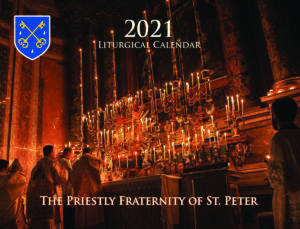 As a special thanks to all who support us, we’ll enter donors into a drawing to win one of several FSSP-branded gifts, and all gifts above $500 will receive an FSSP liturgical calendar. We’ll be sending email, social media, and Missive reminders leading up to Giving Tuesday.
As a special thanks to all who support us, we’ll enter donors into a drawing to win one of several FSSP-branded gifts, and all gifts above $500 will receive an FSSP liturgical calendar. We’ll be sending email, social media, and Missive reminders leading up to Giving Tuesday.
Thank you for your unfailing support of the Priestly Fraternity of St. Peter. With your help, we will continue to bring the fullness of Christ into the emptiness of the world.
Of this you can be certain.
November 16, 2020

Merchandise for Missions
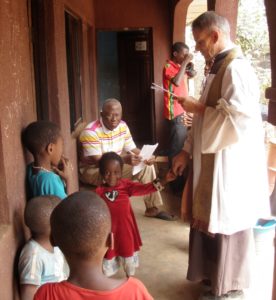
Make a difference and support Mission Tradition with a purchase from our online store Merchandise for Missions.
All profits will directly benefit the FSSP Missions, and you can use these items as a conversation-starter to share your faith with family, friends, and strangers.
The Priestly Fraternity of St. Peter: Merchandise for Missions
For more information on our mission work in Nigeria, Mexico, Colombia, etc., see our Mission Tradition website at: https://www.missiontradition.us/
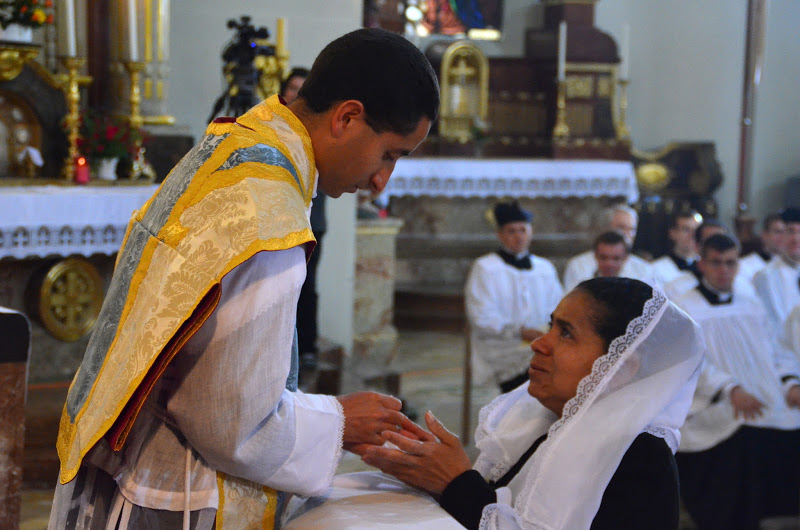
November 13, 2020

Be Prepared for that Last Step: Extreme Unction continued
What is the purpose of Holy Anointing?
When should we receive it? Why do we need it? And why does hell hate it?
First of all, there has been a bit of abuse of this Sacrament in our modern time; although its use has been broadened a bit in relation to a person’s proximity to death due to an illness, it still is only for maladies that have real life-threatening potential. Because an illness may be painful, it does not mean it is life-threatening.
Therefore, anointing someone for a cold, cough, fever, stomachache, ear infection, arthritis or the like is outside the scope of the Sacrament; the ritual actually has special blessings for sick adults and children for cases when Holy Anointing should not be administered. Therefore, there needs to be a clear cause-and-effect relationship between the illness and death.
So if one is diagnosed, for instance, with an untreatable type of cancer, or if a needed treatment of some potentially lethal disease is rather aggressive and has a significant failure rate, then the Sacrament can be received, even at the onset of the sickness, and it can be repeated if the condition worsens considerably; most especially when death seems near. However, as there can be gray areas in these regards, and considering that what is life-threatening for one person may not be another, it is always good to consult a knowledgeable priest in the case of doubt or confusion.
What, then, are the effects of the Sacrament and why are they so profitable to our salvation and perhaps, as death is near, so necessary?
The anointing with consecrated olive oil well represents the effect it signifies: an increase of grace and the comfort that comes with it.
 Christ instituted this Sacrament to give the soul strength and comfort at the time of its likely greatest difficulty and danger. In the presence of the priest who alone can administer it, the Sacrament is ordered to inspire trust and confidence in God, providing the soul with assurance of help against temptation and the fear of dying. It disposes the dying soul to be patient and resigned, to accept the kind of death God wills and understand it as most beneficial to its salvation, while soothing the affections for the loved ones it will soon depart.
Christ instituted this Sacrament to give the soul strength and comfort at the time of its likely greatest difficulty and danger. In the presence of the priest who alone can administer it, the Sacrament is ordered to inspire trust and confidence in God, providing the soul with assurance of help against temptation and the fear of dying. It disposes the dying soul to be patient and resigned, to accept the kind of death God wills and understand it as most beneficial to its salvation, while soothing the affections for the loved ones it will soon depart.
Along with this, the soul finds special strength against the devil, who now endeavors to make his greatest effort to ruin it: as the whole kitchen sink can get thrown into the mix, the soul is assisted to combat the strong temptations that may set in, to repel sadness, despair, and fear of God’s judgment, together with newfound strength to combat the ruling sin of one’s life.
As if this were not enough, Holy Anointing also remits sin and some of its temporal punishment, which is why, incidentally, the sacrament is not to be given to infants or children under the age of reason.
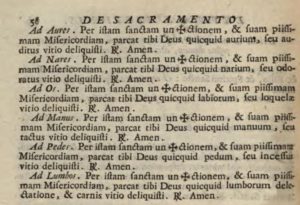 In the older and venerable Roman rite, whenever possible, all the senses are anointed separately, and this is because each sense is a gateway to temptation and sin. While doing so, the priest implores God through the anointing and His mercy to forgive whatsoever sins one may have committed through that particular sense – hearing, speech, touch, and so on.
In the older and venerable Roman rite, whenever possible, all the senses are anointed separately, and this is because each sense is a gateway to temptation and sin. While doing so, the priest implores God through the anointing and His mercy to forgive whatsoever sins one may have committed through that particular sense – hearing, speech, touch, and so on.
Although the Sacrament is primarily concerned with the remission of venial sin, it also can remit mortal sin, provided the person is unable to confess and has at least imperfect contrition. This is why it is so important to contact a priest while the sick person is still lucid and in a good mental state, so as to give him the chance to make a sincere confession before being anointed.
Although the priest must do all he can to dispose a person to repentance, obviously there are greater signs of this when a person is conscious. Furthermore, although it may happen that a good-willed Catholic calls the priest to the bedside of a non-Catholic relative who is unconscious, if the dying person never gave any manifest intent to convert, the sacrament cannot be administered. (While on the subject, if you are wondering what a priest does when he comes across an accident and is unable to determine whether the person is Catholic or not – which is usually the case – he can anoint the person, but he does so conditionally.)
With the forgiveness of sins, Holy Anointing also removes what is called the “remains of sin,” that is, a certain weakness and laziness of soul, whereby new strength is gained to repel a distaste for spiritual things and some of our evil inclinations.
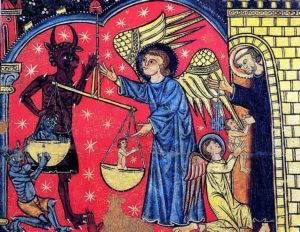 The entire Sacrament, therefore, is all about preparing the soul to meet Christ, its Savior and Judge, which is why everyday we ought to pray for a holy death; that is, a death in a state of grace, fortified by the Sacraments so as to deny the devil his greatest prize. Remember that resigning ourselves to and embracing the type of death God wills is so meritorious that it actually has the potential to remit all the temporal punishment that we have incurred through life due to sin; we can actually bypass Purgatory, because it is a most perfect way in a certain regard to unite ourselves with the Cross of our Lord and His own Death.
The entire Sacrament, therefore, is all about preparing the soul to meet Christ, its Savior and Judge, which is why everyday we ought to pray for a holy death; that is, a death in a state of grace, fortified by the Sacraments so as to deny the devil his greatest prize. Remember that resigning ourselves to and embracing the type of death God wills is so meritorious that it actually has the potential to remit all the temporal punishment that we have incurred through life due to sin; we can actually bypass Purgatory, because it is a most perfect way in a certain regard to unite ourselves with the Cross of our Lord and His own Death.
Holy Anointing is about making that happen; the devil knows that, and that is why he tempts us in so many ways to put off the Sacrament until it is too late because of the strength it gives us to do just that.
Practically then, make sure those closest to you know to call a priest in the event of a life-threatening condition; keep the number handy, and perhaps even carry one of those cards in your wallet or purse that identifies you as a Catholic and that a priest is to be notified in the event of a serious accident. But even in the case of sudden death, call the priest anyway, as a warm body can still be anointed conditionally.
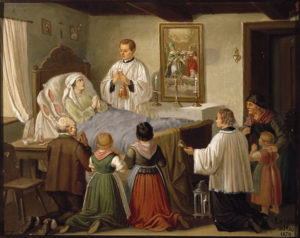 All the Sacraments of the Church are about life, and all the Sacraments of the Church emphasize the God-given dignity of man. Holy Anointing points out that our lives are sacred even unto death, that there is value and meaning in anything we may endure or suffer in a life given over to God. The presence of a priest at the bedside of a dying man or woman bears testimony to God’s commitment to us to the very last moment of our earthly sojourn, and shows how God desires to make use of everything for His glory and our salvation – and the devil’s humiliation.
All the Sacraments of the Church are about life, and all the Sacraments of the Church emphasize the God-given dignity of man. Holy Anointing points out that our lives are sacred even unto death, that there is value and meaning in anything we may endure or suffer in a life given over to God. The presence of a priest at the bedside of a dying man or woman bears testimony to God’s commitment to us to the very last moment of our earthly sojourn, and shows how God desires to make use of everything for His glory and our salvation – and the devil’s humiliation.
We must foster an insistence and stubbornness within ourselves, parents, siblings, spouses, and children over the reception of Extreme Unction when it is our time; let it be the exclamation point on a life-long preparation for death.
Again, Christ gives us what we need: a sacrament to sweeten the pain of separation, a sacrament to help us die in the arms of God, a sacrament to help us take the most important step in life from this world into the next, and a sacrament that should be what God intends it to be – a source of comfort, strength, grace, and health, where we emerge the victor in the fight.

No Stone Unturned: Extreme Unction
The account in the Gospel where our Lord heals the son of a Capharnaumite ruler takes place early in Christ’s public life. (cf. Jn. 4:46-54)
This ruler, having heard something about Christ that impacted him, begs our Lord to come to his house and heal his son, who is at the point of death. Christ rebukes the man over wanting to see signs and wonders in order to believe.
But the man persists, and our Lord heals his son–albeit not in the way he requested.
Our Lord’s word was sufficient for him, and this ruler would merit to receive from Christ not only the cure of his son, but the gift of faith, and faith even for his entire house. So in healing the body, Christ also ministered to the soul.
All the Sacraments of the Church have a specific purpose.
God knows best what our souls need most, and Christ organized the means by which all the needs of the soul are attended to throughout life, provided the necessary dispositions for their reception are present.
If there was not a true need–that is, if there was not a real impoverishment on our side, there would be no Sacrament for it.
So when it comes to bodily death and serious illnesses linked to death, there exists with it a corresponding spiritual condition that requires a special Sacrament, a special channel of grace that is both a support and a remedy for this condition.
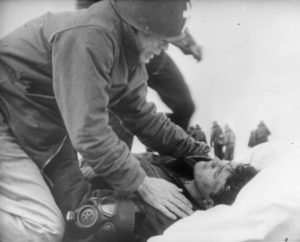
With the powers of hell running out of time to claim its prize, and with depleted energy on our side from illness that leaves us weakened to resist the special types of temptations that may come, Christ leaves us with a weapon that supplies us with the graces we need most at these moments. So we should take example from the faith of this ruler, which prompted him to seek Christ out to help his dying son, and have prompt recourse to the sacrament of Extreme Unction (or Holy Anointing) whenever there is danger of death, either for ourselves or someone we love.
Regrettably, a challenge we face in our modern day is a world that has become incredibly desensitized to death. People generally live in a state of denial about death and the reality of a particular judgment before God and an afterlife which could either be quite happy or quite the opposite.
Catholics are not exempt from this, which is manifested by the widespread disregard of the importance of Extreme Unction.
Often the priest is not called because either the family does not know to do so or – and this is common – does not want to alarm the person who is dying.
Christ tells us that the Son of Man will come like a thief in the night and we do not know the day nor hour. So, all things being equal, how we live tends to be how we die.
While our time on earth is a time of mercy, the fact that many assume nowadays that anyone who has died must now be in a “better place” amounts to a grave presumption on Christ’s mercy and does a tremendous injustice to souls who, although perhaps saved, stand in great need of our prayers to temper the satisfaction God demands in purgatory.
This may remind us of the children at Fatima who asked our Lady about the state of soul of a teenage friend of theirs who recently died, and our Lady replied that she would be in purgatory until the end of time.
Although that may be a little discomforting to hear, what it proves is the reality that Christ indeed gives us everything we need in the way of grace to enter heaven upon death and that He wants it to be used while He stands ever-ready to assist us in our trials and labors.
He leaves no stone unturned.
If there is a way, He finds it, He makes it happen.
And so Extreme Unction serves as the final medicine for us in our preparation for death, judgment, and what should be heaven, made possible only by Almighty God.
November 11, 2020

Swine and Demons
by Fr. Gerard Saguto, FSSP.
In the fifth chapter of the Gospel according to St. Mark, after a stormy night on the sea, our Lord and the Apostles land on the shore of the Gerasens.
Although these people traded with the surrounding areas, they kept to themselves for the most part. Upon landing, Christ encounters a man possessed for a long time by an unclean spirit whose name is Legion, “for we are many”. Quite the spectacle and menace to anyone who passed by.

The demons, in agony before Christ and forced to homage Him, mysteriously beg our Lord that He not send them back into the abyss before it is time, and instead ask to inhabit a herd of swine grazing in a nearby field.
Christ permits it, and the next thing we see are thousands of swine hurtling themselves off the cliff into the sea and drowning.
This must have been quite the show, especially for the swineherds, who perhaps had caught notice of the boat mooring on the shore and then watched in curiosity, in hopes of being entertained by its passengers running into the demoniac of the caves.
But the man was liberated, after enduring many years of torment, and that should have been a cause for some celebration.
The freak show was over; this mysterious man named Jesus had freed him. God be praised! And the man was most grateful.
Nonetheless, in those few short minutes our Lord had effectively upset the flow of life for the Gerasens – and this was a problem.
Time was going to be needed to pick up the pieces. To them it was better had Christ never come. And so an embassy is sent to Him, politely requesting that He depart.
Our Lord puts up no resistance, but insists that the man He just healed remain as a living testimony to Him, to dispose them for a future visit, whenever that might be.
While we can somewhat understand why things ended the way they did here, it can still be baffling to think that these people preferred their swine and demons over Christ.
For them, it was better that way, even if it was to their immediate and substantial loss, of which they were incapable of realizing.
In His efforts, Christ, who makes no mistakes, seemed to have been defeated (again).
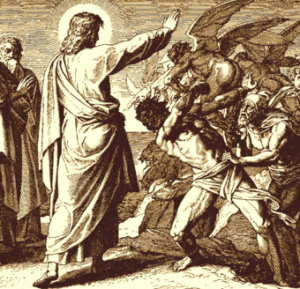 Only one, the man Christ liberated, was ready to keep Him around. That is because the man was conscious of the work Christ had performed, understood it, and was grateful for it. As far as this person was concerned, there was no contest, and the decision was obvious; swine and demons were absurd commodities.
Only one, the man Christ liberated, was ready to keep Him around. That is because the man was conscious of the work Christ had performed, understood it, and was grateful for it. As far as this person was concerned, there was no contest, and the decision was obvious; swine and demons were absurd commodities.
But now he still was to live among those who wanted swine and demons.
Imagine the disappointment. Yet the directive came from our Lord Himself – he had to comply.
How would he convince people like this that the swine and demons are not the gold and silver they believe them to be? How are those who think they have a right to swine and demons convinced that these are not really rights, but paths of slavery and perdition? How are those who prefer the immediate gratifications that come with swine and demons ever expected to deny themselves and realize that the happiness Christ promises is worth selling all?
The plain fact is that many probably will not.
But some will dispossess themselves, by the grace of God, on account of the walking witness Christ left among them, and whose faith would never waver. Christ found a follower in someone who, in human terms, should never have followed. We all fall into that category in some way.
The world prefers demons and swine, and it will be really ugly at times.
Christ came to give it the only way out. Like this man, we are liberated from them by our baptisms from the Cross.
And like this man, in season and out of season, we are commissioned to live in the world as it is and to be the walking witnesses of Christ Crucified to prepare it for His arrival again, whenever that may be.
November 9, 2020

Catherine Gandeaktena, the first Kateri
In the Year of Our Lord 1654 an Iroquois army plunged into the Erie homeland, destroying the villages of Gentaienton and Rigué, and reportedly causing so much carnage that the blood ran knee deep in some places.
The survivors fled deep into the woods and all but disappeared from the pages of history, as the triumphant Iroquois returned home with spoils and captives.
 Among these latter was a young Erie woman named Gandeaktena—and it would later be said that the “misfortune of her country proved the blessing of the captive.”
Among these latter was a young Erie woman named Gandeaktena—and it would later be said that the “misfortune of her country proved the blessing of the captive.”
Gandeaktena was adopted into the Oneida nation of the Iroquois and married a fellow captive, a Christian Huron by the name of Francis Xavier Tonsahoten. He was a skilled warrior and hunter, and quite moody and difficult by temperament. Yet as long as lived, he so treasured the memory of his wife that on the occasions when his irascible nature showed itself, he could be calmed in an instant by the mere recollection of her.
In 1667 the Jesuit Jacques Bruyas came to preach to the Oneida. Moved intensely by the Gospel message, Gandeaktena began meeting with the priest for instruction, helped him learn the Iroquois language, and attended chapel regularly.

Her pagan relatives attempted unsuccessfully to dissuade her from Christianity, but they only served to increase her desire to leave Oneida and settle among the French where she could pray in freedom.
So in 1667 Gandeaktena, Francis Xavier, and a little band of seven souls journeyed to the French Canadian settlements over the ice.
In Quebec she was baptized by Bishop Laval, took the name Catherine (or Kateri in Mohawk), then with her husband moved just south of Montreal to help establish a brand new settlement called La Prairie.
From these humble beginnings sprang the great Iroquois mission at Kahnawake which became renowned for its piety and religiousness. So much so that, among the Iroquois, “he has gone to La Prairie,” became an expression of its own, used to mean the man had given up his former vices and was now living as a Christian.
Catherine Gandeaktena’s virtues played no small part in the reputation of the famous mission she founded.
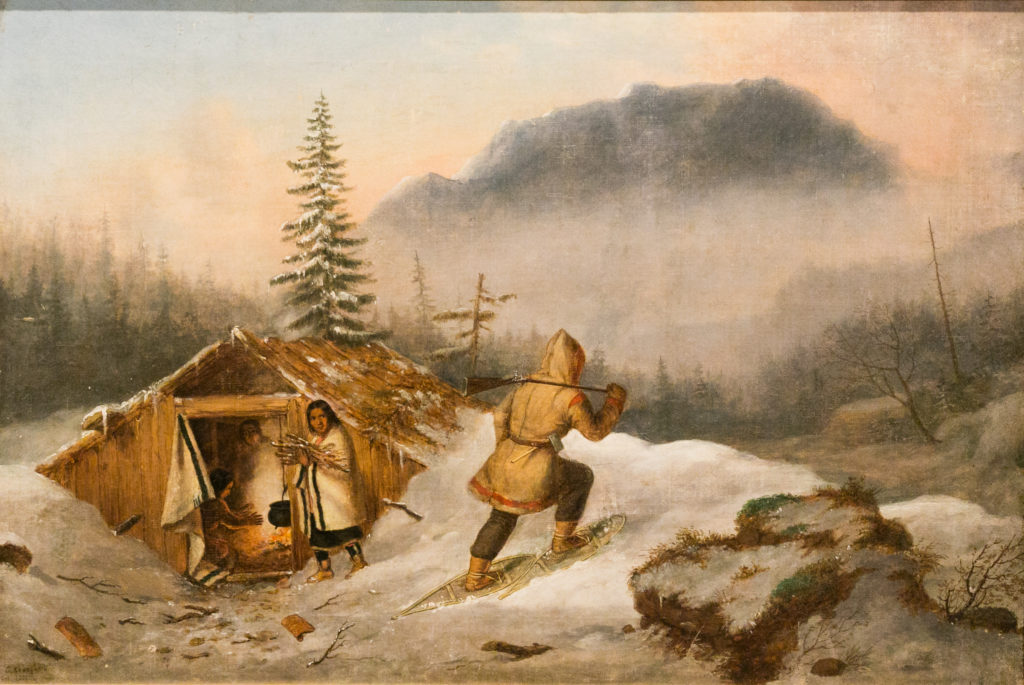
She came to be called by the Indians the “Mother of the Poor”, the “Good Christian” and the “Pillar of the Faith”. Their cabin became a haven for the poor and discontented, and she instructed and catechized many who lived in or passed through the village by the hundreds on the way to the hunting grounds of Canada.
So great a charity beat in her noble heart that her confessor had to prescribe limits to it—she was accustomed to “give the best of what she had, and in a quantity which was even excessive.”
Catherine also established a branch of the newly formed Confraternity of the Holy Family at the mission. Its members were a group of the most devout converts, who said as many as 20 rosaries per day and were the mainstay of the mission’s Catholic life.
After five years of devoted charity, Catherine convinced her husband to give away the last bit of wealth they owned–a belt of wampum beads. They presented themselves before the Blessed Sacrament, where she prayed the following:
“My God, four years ago, I gave to you my body and soul, and the greater portion of my goods. Here is what remains to me; I present it to you with all my heart. What should I now ask of you after having given you my all, unless it be that, from this moment, you take me yourself, to place me near you?”
The very next day Catherine was struck by a headache and fever.
She sensed with joy that the Lord had answered her prayer. Francis Xavier and her other loved ones crowded around her bedside, while the ministering priest had her pray for her own recovery. But she quickly added:
“It has been impossible for me to say from the heart what I have just uttered with the lips. Why ask to remain on earth, since God is calling me to heaven?”
Soon after receiving the last sacraments, Catherine became delirious. Her husband continually exhorted everyone to say rosaries on her behalf, and after 8 days of their “unceasing prayer” she slipped into a final peaceful coma.
Catherine Gandeaktena died to this world on November 6th, 1673.
Her husband distributed all her remaining goods to the poor, asking only for prayers for her soul. It was generally believed, however, by Black Robe and Indian alike, that her soul had attained the final bliss of heaven.
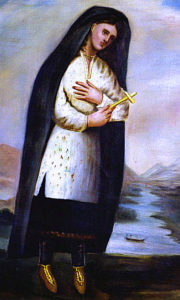
Only a few years later another Catherine, surnamed Tekakwitha, would seek refuge among the devout Christians at the same mission, and her reputation would quickly eclipse that of her predecessor.
But it was the holy example of the first Kateri, Catherine Gandeaktena, that prepared the seed-bed for St. Kateri’s arrival. It was she who founded the mission of Christian Iroquois at Kahnawake, and who prepared the spiritual soil in which the Lily of the Mohawks would bloom.
November 6, 2020

Litany for the Holy Souls in Purgatory
Devotion to the holy souls in Purgatory is as simple as it is easy. For that reason, this devotion can easily be incorporated regularly in the family prayers, and even in the basic prayer life of a child. Most children know what it is like to have “time out” for behaving badly, and how happy they can be if they are let out early, or if another sibling may be allowed to come in and keep them company. Based on this, children can be taught from an early age how something as simple as a Hail Mary or an Our Father said for a soul in purgatory, or offering up a chore, is like spending some time with a soul, to comfort it, to help it get out of its “time out” early. At the same time, they can readily understand how the “time out” was avoidable had they behaved the way they should have. +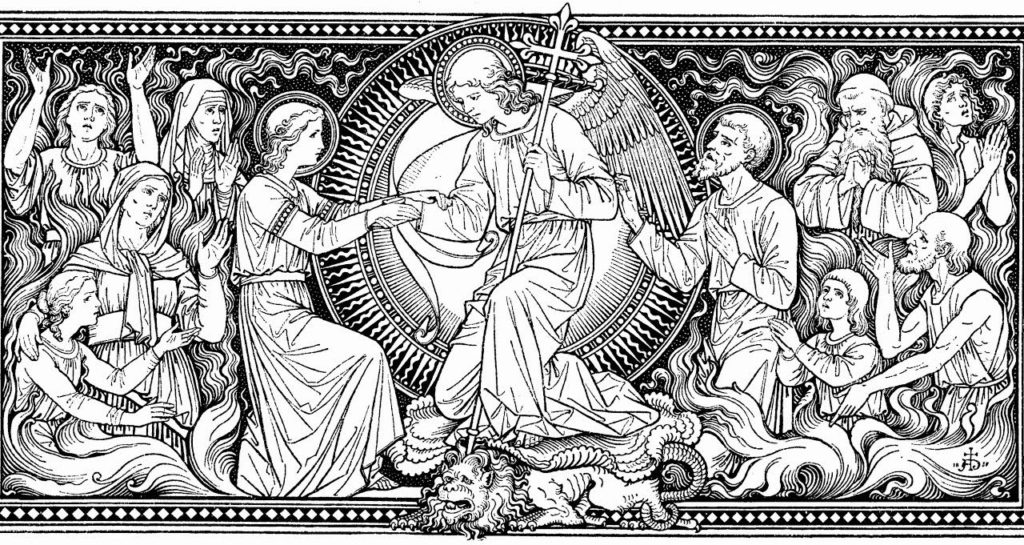
Litany for the Holy Souls in Purgatory
O Jesus, Thou suffered and died that all mankind might be saved and brought to eternal happiness. Hear our pleas for further mercy on the souls of:
My dear parents and grandparents, my Jesus mercy!
My brothers and sisters and other near relatives, my Jesus mercy!
My godparents and sponsors of confirmation, my Jesus mercy!
My spiritual and temporal benefactors, my Jesus mercy!
My friends and neighbors, my Jesus mercy!
All for whom love or duty bids me pray, my Jesus mercy!
Those who have offended me, my Jesus mercy!
Those who have suffered disadvantage or harm through me, my Jesus mercy!
Those who are especially beloved by Thee, my Jesus mercy!
Those whose release is near at hand, my Jesus mercy!
Those who desire most to be united to Thee, my Jesus mercy!
Those who endure the greatest sufferings, my Jesus mercy!
Those whose release is most remote, my Jesus mercy!
Those who are least remembered, my Jesus mercy!
Those who are most deserving on account of their services to the Church, my Jesus mercy!
The rich, who now are the most destitute, my Jesus mercy!
The mighty, who now are powerless, my Jesus mercy!
The once spiritually blind, who now see their folly, my Jesus mercy!
The frivolous, who spent their time in idleness, my Jesus mercy!
The poor, who did not seek the treasures of heaven, my Jesus mercy!
The tepid, who devoted little time to prayer, my Jesus mercy!
The indolent, who neglected to perform good works, my Jesus mercy!
Those of little faith, who neglected the frequent reception of the Sacraments, my Jesus mercy!
The habitual sinners, who owe their salvation to a miracle of grace, my Jesus mercy!
Parents who failed to watch over their children, my Jesus mercy!
Superiors who were not solicitous for the salvation of those entrusted to them, my Jesus mercy!
Those who strove for worldly riches and pleasures, my Jesus mercy!
The worldly-minded, who failed to use their wealth and talents in the service of God, my Jesus mercy!
Those who witnessed the death of others, but would not think of their own, my Jesus mercy!
Those who did not provide for the life hereafter, my Jesus mercy!
Those whose sentence is severe because of the great things entrusted to them, my Jesus mercy!
The popes, kings and rulers, my Jesus mercy!
The bishops and their counselors, my Jesus mercy!
My teachers and spiritual advisors, my Jesus mercy!
The deceased priests of this diocese, my Jesus mercy!
The priests and religious of the Catholic Church, my Jesus mercy!
The defenders of the holy faith, my Jesus mercy!
Those who died on the battlefield, my Jesus mercy!
Those who fought for their country, my Jesus mercy!
Those who were buried in the sea, my Jesus mercy!
Those who died of apoplexy, my Jesus mercy!
Those who died of heart attacks, my Jesus mercy!
Those who suffered and died of cancer, my Jesus mercy!
Those who died suddenly in accidents, my Jesus mercy!
Those who died without the last rites of the Church, my Jesus mercy!
Those who shall die within the next twenty-four hours, my Jesus mercy!
My own poor soul when I shall have to appear before Thy judgment seat, my Jesus mercy!
Eternal rest grant unto them, O Lord, and let perpetual light shine upon them: For evermore with Thy saints, because Thou art gracious.
May the prayer of Thy suppliant people, we beseech Thee, O Lord, benefit the souls of Thy departed servants and handmaids: that Thou mayest both deliver them from all their sins, and make them to be partakers of Thy redemption. Amen.
Eternal rest grant unto them, O Lord.
And let the perpetual light shine upon them.
May their souls and the souls of the faithful departed, through the mercy of God, rest in peace. Amen.
November 5, 2020

The Protomartyr of California
On March 12th, 1771, a band of 10 Franciscan missionaries disembarked at Monterey to receive their assignments from the superior of the missions of Alta California, St. Junipero Serra.
Among these was Fr. Luis Jayme, described in the records as a “person with well proportioned physique, somewhat thin, and of a darkish complexion.” Fray Luis was a native of Mallorca who had studied in the convent school of San Bernardino, once attended by the fellow Mallorcan Serra himself.
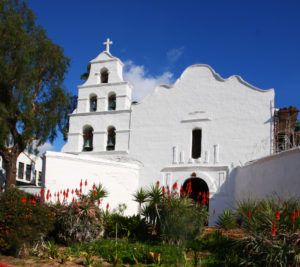
By July 14th, Fray Luis had arrived at his new post at the mission of San Diego, to minister to the Kumeyaay Indians, also known as Diegueños.
Though the priest had some successes there, he found it plagued with significant problems, including its disadvantageous location atop Presidio Hill. As he wrote to his superior Fr. Serra in 1773: “it seems that as long as the mission is here, it will never have a firm basis. Nor should there be mission here, on account of the scarcity of water.”
It was thus agreed to move the mission to a better-watered and more fertile place called Nipaguay. Conversions increased dramatically there, with about 60 Indians baptized on the vigil of St. Francis, October 3rd, 1775, to add to a large group already brought into Holy Mother Church.
But this success, as Fr. Francisco Palou later recorded, inspired the devil to plan
“an attack on this spiritual conquest, and God in His inscrutable judgments permitted Satan to revenge himself upon those who had snatched so many souls from his infernal clutches.”
At 1 o’ clock in the morning of November 4th, 1775, a band of 600-800 warriors, including apostates from the missions, snuck onto the compound. They ransacked the chapel and then began to set fire to the buildings and kill some of the residents.
Awakened by the commotion, Fray Luis left his bed and approached some of the warriors
“Amar a Dios, hijos!” he greeted them: “Love God my children!” This was not a warning or command; merely his customary greeting.
But in return, the warriors seized the poor friar and dragged him down to the nearby river, where they stripped him, riddled him with 18 arrows, and then beat out with clubs whatever little life remained to him.
The next day. grieving residents found his disfigured body, only able to identify the priest by the whiteness of his skin. The only part of his body left intact were his hands alone–the tools with which he had offered the Holy Sacrifice of Mass.
St. Junipero Serra, upon learning what had happened, remarked:
“Thanks be to God: that land is already irrigated [with blood]; now the conversion of the Diegueños will succeed.”
If that sentiment at the death of a confrere strikes modern man as insensitive, it is because we, unlike the Apostle of California, have grown lax in our supernatural faith and have placed too much stock in our achievements of this world rather than our standing in the next.
For the martyrs of a much more ancient time have passed on a phrase that surely was behind St. Junipero’s reply:
The blood of the martyrs is the seed of the Church.
Today, November 4th, we remember the protomartyr Fray Luis Jayme, and the blood he spilled so that the Church in California could flourish among the glorious flowers of the New World.
November 4, 2020











